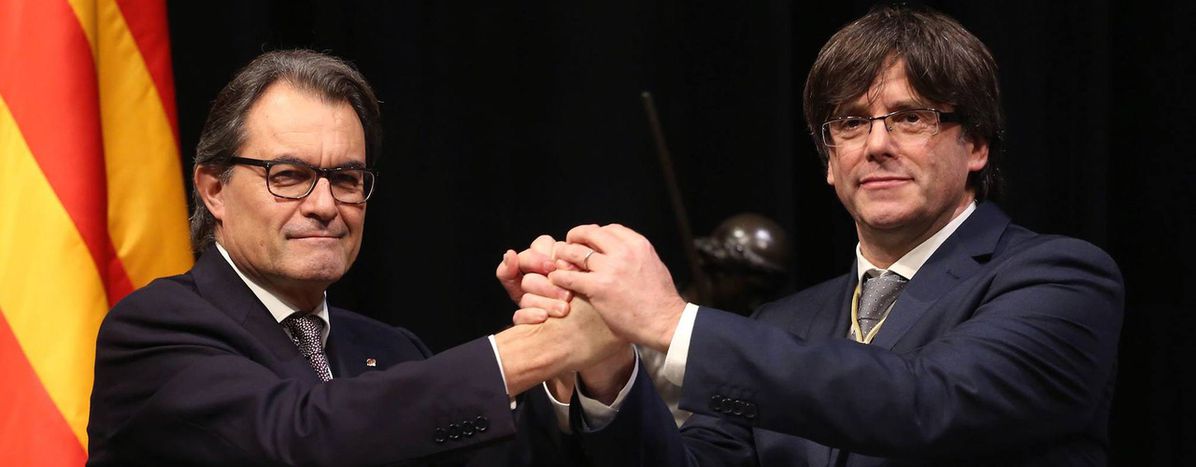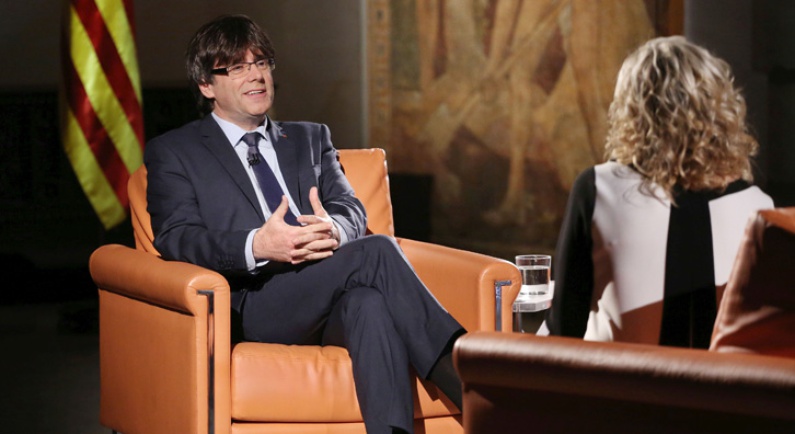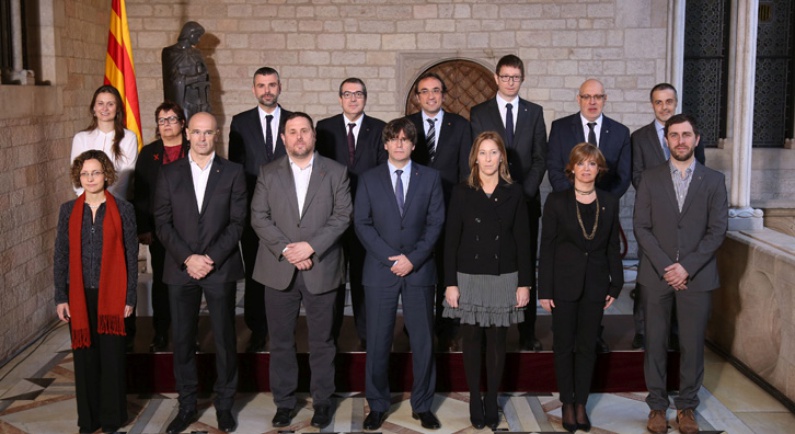
Catalonia: Independence will not be a unilateral decision
Published on
Translation by:
Mariana LicioThe new Catalan government is already working on developing foundations for a future Catalan Republic, continuing the process initiated by its predecessor. However, both the national government and the opposition refuse to support this process.
Upon taking office, the new President of the Generalitat of Catalonia, Carles Puigdemont stated that his government had no intention of unilaterally declaring independence.
During an interview with the Catalan public television channel, Puigdemont clearly said that the elections on the 27th of September indicated a need to set a course for establishing the foundations needed to guarantee the stable independence of Catalonia under its new Constitution: "If we do this right, the referendum for the Catalan Republic Constitution will give the opportunity to those who voted 'No', to now vote 'Yes'."
 They have an 18-month period in which to complete the independence process. The deadline, established by former president Artur Mas during his election campaign, is now being put into perspective by his successor: "The deadline cannot act as a restraint. If we can accomplish our goals in this time, that's great, but if we need to extend it, that won't be a problem either."
They have an 18-month period in which to complete the independence process. The deadline, established by former president Artur Mas during his election campaign, is now being put into perspective by his successor: "The deadline cannot act as a restraint. If we can accomplish our goals in this time, that's great, but if we need to extend it, that won't be a problem either."
Easy does it. That's the way the heir to Artur Mas wants to deal with things, and he has done so in a less belligerent manner than his predecessor. The goal of his presidency is "to do the right thing", to "provide every possible guarantee" and to keep an open communication with the central government through dialogue, a government that so far has stood resolutely against the independent process, discounting it as illegal.
The new Catalan government was put together more than three months after the elections of September 27th. President Puigdemont was invested on the last day possible under the law. A few hours later would have been enough to force Catalonia to return to the ballot box and elect a new government.
On the day of Puigdemont's investiture, he affirmed that Catalonia lies "between post-autonomy and independence". He understands that his team has the strength and legitimacy to commence the rupture, but also questions if, given the current parliament, he has enough strength to proclaim independence.
It seems the answer remains: "Not yet!" As he said in his interview with TV3: "We won't make a unilateral declaration of independence. It is not within our prerogative to do so."
A Foreign Affairs advisor for Catalonia
It's been a long time since Catalonia last demanded adherence to the Spanish Constitution from those it invested into public office. The independence issue is no exception, though it is likely to have much larger repercussions than usual, as not only the Catalan opposition but also the Central Government consider the process illegal and unconstitutional.
This omission is already being investigated by the State Attorney's Office, as there were absolutely no references to the constitution or to the Head of State in the proposals.
Similarly, there is not mention of either in the investiture of new councilmen. During the ceremony, President of Parliament and former political activist for the right to independence, Carme Forcadell, asks councilmen: "Do you promise to abide faithfully and according to the law, to the obligations you take on as councilmen, in honour of Catalonia and the President of the Generalitat of Catalonia?"
After answering, "I promise to do so," Puigdemont's advisors immediately began working on preparing Catalan institutions for independence.
 The government of Catalonia is now clearly independent, integrating members of those parties who came together to run for election under the pro-independence coalition, Junts Pel Sí. The party has made numerous transfers of personnel between its ministries, and has also created a new department within the Catalan government: Foreign Affairs.
The government of Catalonia is now clearly independent, integrating members of those parties who came together to run for election under the pro-independence coalition, Junts Pel Sí. The party has made numerous transfers of personnel between its ministries, and has also created a new department within the Catalan government: Foreign Affairs.
Raúl Romeva – head of the lists for Junts Pel Sí who has also been a member of the European Parliament for the Catalonia Greens (Iniciativa Catalunya Verds) for the past ten years – will now work to avoid confrontation with the Government in Madrid, as well as any future Spanish government.
Up until now, these responsibilities were in the hands of a general secretary. This promotion comes as no surprise, since it reflects the Generalitat's intention to promote their separation from Spain on an international level.
After being sworn in, Romeva explained that Catalonia is "a society with much to offer to the rest of the world. As such, it's important not only to show what we can offer, but to gain affinities. We can be a great asset for both the European and international spheres." From now on, Romeva will act as the newly created Minister of Foreign Affairs, looking for international partners that support the independence project. So far, this attempt has proved fruitless.
In 2015, several Catalan diplomats visited countries such as the USA, Belgium, Sweden, Uruguay and Paraguay – several of which have been slandered by resident Spanish diplomats. The Generalitat of Catalonia has established offices in (among others): New York, London, Brussels, Paris and Berlin. The most recent additions are in Rome and Vienna, created during Artur Mas' mandate. Catalonia also has a major network of regional overseas offices, mostly addressing language, culture and touristic matters.
Engaging in such overseas promotion forms part of new government guidelines. Since establishing a Constitution they have worked non-stop towards achieving the goal of independence. Attaining such a goal depends mostly on the new presidency and its main institutions.
It's worth noting that pro-independence parties Esquerra Republicana de Catalunya (ERC) and Democràcia i Llibertat (DiL, Artur Mas' former Convergència Democràtica de Catalunya) also carry important weight in ongoing negotiations to form a Spanish Parliament, each with 8 and 9 representatives respectively.
Today, Spain is undergoing effervescent political changes and the Independence issue, rather than being cast aside from state matters, is considered a key debate when it comes to the future of the country.
Translated from Declaración unilateral no. Independencia sí.



